[Guide] How to Find and Contact Bloggers in Your Industry

There are, I've found, two primary reasons why people generally want to reach out to bloggers in their industry.
- You want to hire them to write for your blog.
- You want to network with them for guest posting or other promotions.
Luckily, both of them can make use of the same strategies to find and contact bloggers; the only difference is in picking the specific bloggers to contact, and in the message you send them.
So, read on, and I'll tell you how to do it.
Step 1: Identify Target Bloggers
The first step is both the easiest and the hardest.
You need to identify the specific bloggers you're going to reach out to and try to contact - this is the easy part.
To do this, you need to know why you're trying to reach out to them. The process for reaching out to them will be the same, but the list of target bloggers will be different. Wanting to guest post on someone's site is different from wanting to hire them to work for you, after all.
There are a few ways to find talented bloggers who have a knack for writing about your industry:
- Identify sites in your niche, identify the bloggers who write for those sites, and analyze them for viability.
- Look for people who are sharing content on social media in your niche, and identify the bloggers behind that content.
- Look for blogger/industry/niche communities such as Facebook groups, web forums, and subreddits, and find the content creators in them.
- Check other forms of multimedia, like YouTube channels or podcasts, and identify the creators to see if they also write blog articles.
Your goal is to build a list of prospective bloggers.
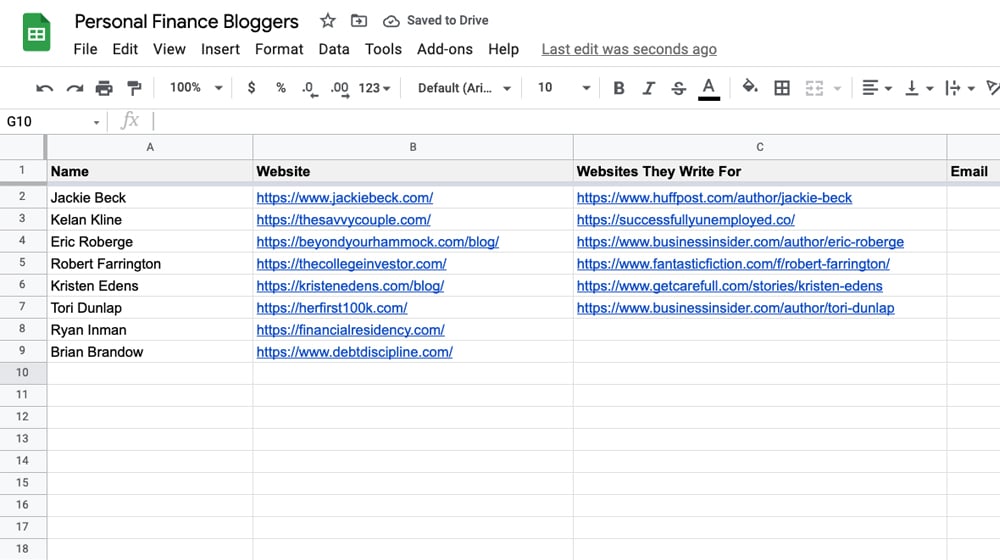
I like to build a spreadsheet with the blogger name, and then a series of columns for additional information:
- Their primary website.
- Any other websites they write for.
- Their contact information, once I find it.
- An estimate of their viability.
- Their LinkedIn account (if you can find it) and whether they are currently employed or freelance.
This last one is tricky. You need to figure out how likely this person is to give you the time of day. You can consider various factors in this estimate, such as:
- How large their site is compared to yours. If you started your blog a week ago, someone like Neil Patel probably won't give you the time of day (unless you're willing to pay).
- How frequently they guest post or write for sites other than their main site. Someone like Kristi Hines is all over the web in the marketing niche; she's probably fairly approachable.
There are other factors too, of course. You can, for example, search their name with the keyword "guest post" to see if they've written anything on the subject that might express their personal opinions, or how to contact them. You might also see if they've written anything about you before.
Step 2: Look for Easy Contact Information
Once you've identified target bloggers, the first thing you can do is just look to see if they're open to being contacted.
To keep using Kristi Hines as an example of an approachable blogger for hire, check this out.
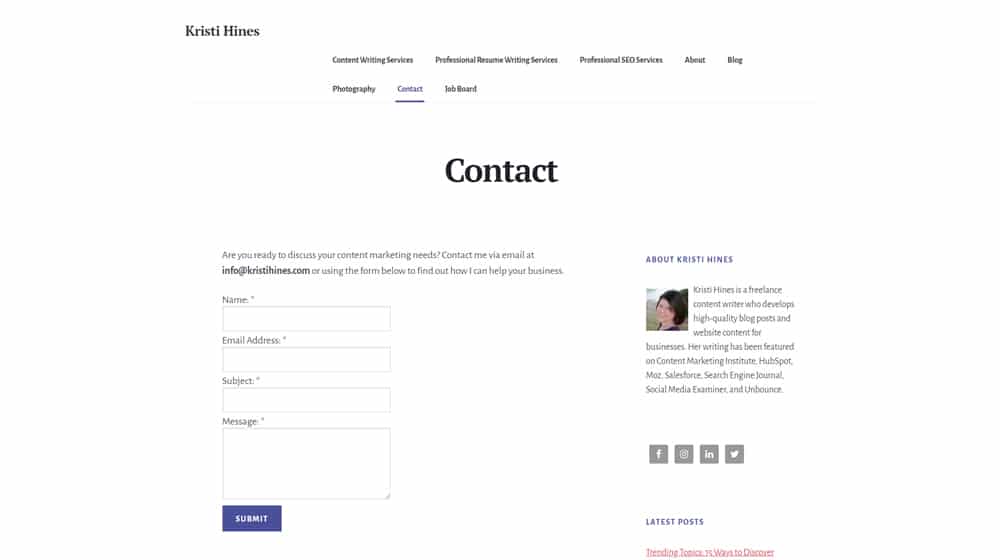
She has three options available right off the bat:
- Her personal/professional website contact page has a form you can submit.
- That same page lists info(at)kristihines.com as an email address you can contact.
- She has a dedicated page for content writing services with a form you can submit.
She's easy to approach and very friendly, primarily because her business is providing freelance writing for businesses and professionals who need her services. However, you can bet on one thing: she's going to charge for her services for just about anyone. Perhaps a few high-end bloggers will be good enough opportunities for her to accept backlinks and mentions as a peer, but for the most part, she has a business to run and she charges for her services.
In marketing, and in some industries where networking is part and parcel of the niche, you'll find easy contact methods for many contributors. In other industries, not so much. Try looking in their author's bio and on social media for options.
This isn't necessarily a bad thing. The more easily you can contact a blogger, the more likely they are to have a rigidly codified system for networking and blogging (and the more likely they are to charge a fixed price for their services.)
Now, if you want to hire a blogger to write for you, that's fine. If you want to reach out to them to guest post for them or ask for a guest post, it's a little trickier. Often, you aren't going to want to pay for a guest post slot, so you have to find bloggers who are receptive to networking. It helps if you aim for peers or smaller creators for this.
Step 3: Look for Personal Sites
We used an easy example of a prolific blogger with a personal site that you can look up. A lot of bloggers don't have secondary personal sites, though. You'll have to find their business website and to find their business site you'll have to find their business name.
The simplest way to do this is to simply Google the name of the person. Often, you'll find a business site that isn't owned by someone else, usually focused around their primary service. Ann Smarty, for example, owns SEOSmarty, which you can use to reach out to her. I have a personal website as well, though you can reach me through my business site (this one) just fine.
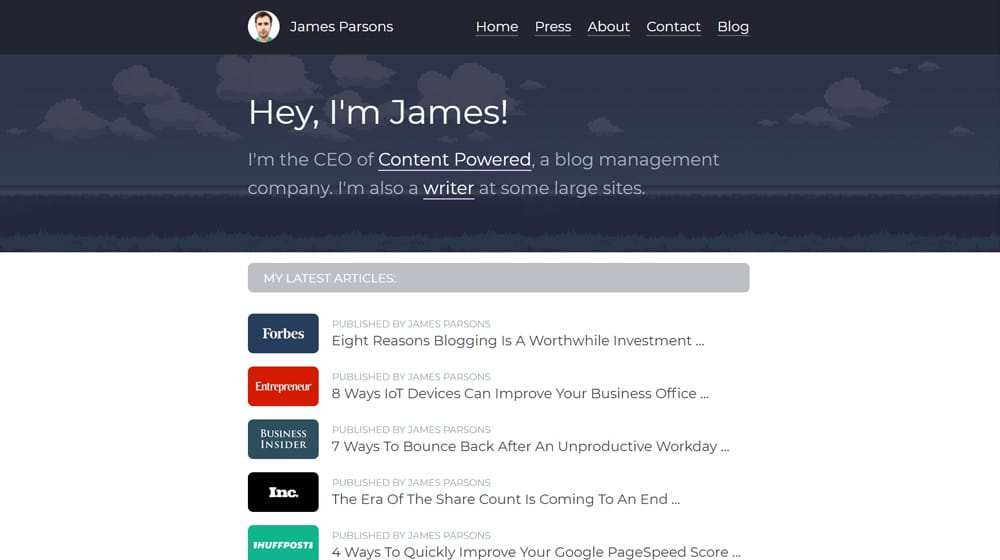
Often, a blogger will have their primary site listed in their author bio on other sites they write for. If not, they likely have social media profiles you can find, typically Facebook, Twitter, LinkedIn, or Instagram. Look for active profiles.
Step 4: Use a Third-Party Tool to Scope Contact Information
If you can't easily find contact information, there are a ton of third-party services out there that will try to do it for you. Some of them will fail, of course, but that's why many of them are free for a single basic use like this.
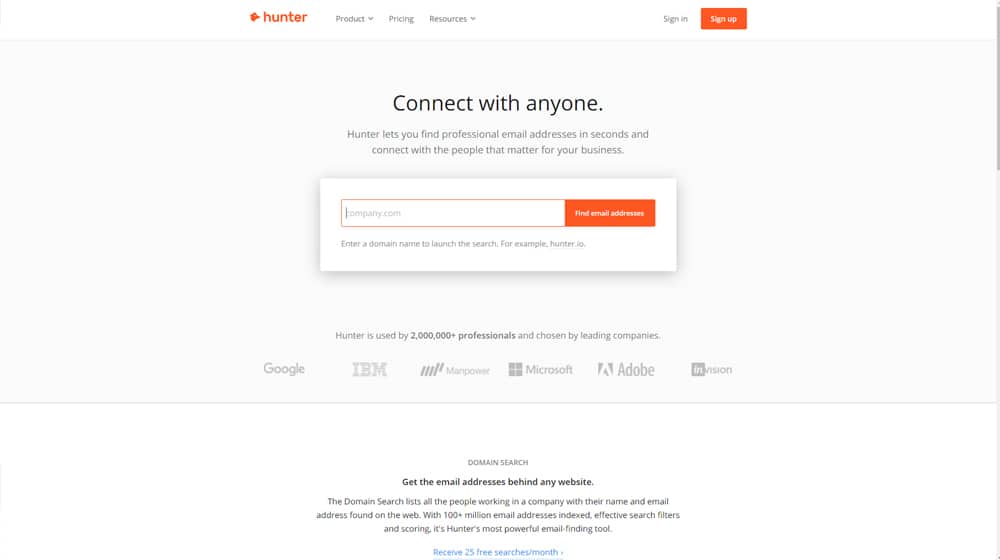
Here are my favorites:
- Hunter.io. A free service that scrapes sites looking for names of people involved with them, and contact information associated with them, including information from various sources to verify it. They also have paid access that enables you to run bulk searches. It works well, but doesn't always work on smaller sites or websites that they haven't had the chance to index yet.
- WhoIs. WhoIs is the webmaster lookup for domain name registration. For some bloggers, you can look up who owns the domain name for their site, and what their contact information is. Unfortunately, over the last half a decade, privacy has grown much more prominent as a concern and many registrars automatically apply registrant protection to hide that information. Sometimes you'll get lucky, though.
- Anymail Finder. Like Hunter, but more focused on contacts management. You need to register to see results, but they try to focus only on verified active email addresses, so when you get a hit, it's more likely to be an accurate result.
You can also use dedicated outreach communities and tools. These typically charge a small fee but offer access to communities specifically for outreach. NinjaOutreach, Influence.co, Pitchbox, and Klear are a few examples. Just be cautious with dedicated "blog outreach" services - they occasionally get kind of spammy and you'll likely end up with a bunch of private blog network links.
Most people think that they can tell the difference between a PBN link and a non-PBN link, but let me tell you, these companies do a very good job at making it difficult to discern the difference.
Frankly, one of the best ways to find contact info these days is using search engines. Usernames can lead to forums, forums can lead to information in forum signatures, forum signatures can lead to websites, and websites can lead to an email. If you're persistent, you can find just about anything on search engines.
Social media exists for people to connect and meet new people, so why not use social media to reach out to the bloggers you want to target? Often, you can find social media profiles for individual bloggers, and drop them a line. A Twitter DM, a LinkedIn InMail, or a message on Facebook can all be perfectly fine options to contact a blogger.

The trick is, all of these services have a lot of roadblocks you have to navigate.
- Make sure the profile is active. It does you no good to send a message to a Twitter account that hasn't been updated in three years.
- Make sure you're messaging the right account. A lot of similar names or brand names can confuse people, and you don't want to message the wrong person when you're looking for a particular blogger.
- Make sure you're reaching a professional account. Don't go to someone's personal Facebook profile – especially if they keep it private – and try to worm your way in, especially if they have a business profile as well.
You also have to worry about the natural spam blocking features of these networks. For example, you can't get a reply from a business Twitter account unless you follow them, and Facebook puts "message requests" from people you don't know in a separate folder that may not even have notifications attached. Just keep those things in mind if you try to message someone and don't get a response.
Step 6: Familiarize Them With Your Name
The true secret to reaching out to a blogger you want to work with is to do some groundwork first.
It's one thing if you want to hire a blogger to do work for you. When money is involved, and when the blogger has a service page, it's easy to just reach out to them. They're going to be responsive (unless you're in a niche they don't work with, or are lowballing them) because it's their job. It's another thing entirely if you're just trying to network.
Networking with other bloggers typically means you want to make yourself part of their community. Think about it; if someone you've never heard of before sends you a message asking if they can guest post for your site, what are you going to think? Probably that they're a low-quality or spam blogger just hoping to get a backlink, and that their content won't be very good.
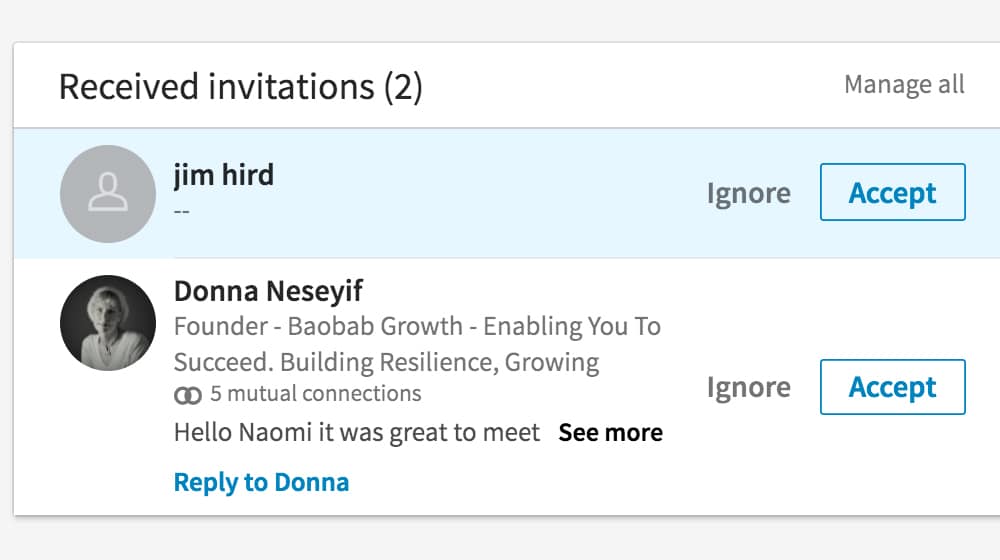
What about if one of your favorite and most engaged commenters reaches out asking if they can contribute? What if someone whose name you recognize from high-profile publications reaches out? That's a different story.
How do you ingratiate yourself with a target blogger?
- Start early. You want months of lead-up, if not more. I start cultivating my relationships a while in advance.
- Follow their main blog and read it (or "read" it) religiously. More importantly, leave comments on their blog posts. Try to find something meaningful to say - don't just leave a comment that says something like "another great blog post as always!". Think about the kind of blog comments you would like to see on your website, and leave those insightful comments on your target's blog.
- Follow their social media profiles.
- Do your part to help promote social media. Retweet Twitter posts, share Facebook posts, pin Pinterest content, and so on. Use the mechanism given to you by the platform.
- Don't forget to reply there occasionally as well. Try to make your comment distinct from the one you write on their site directly. I like to leave a comment on their blog about the content of the post itself, and leave a social media comment about the overall topic.
- Keep at it. You're not going to get a foot in the door with 3-5 comments and shares in an afternoon. The idea here is that when you finally reach out to them, you want them to recognize your name to improve your chances of getting a reply back.
A key component of this is personal branding. You want to make sure your Gravatar, your social media profile pictures, and any other profile pictures you use, are all the same. Names, images, links; all of these should all be consistent so that the blogger recognizes you from each different location.
Step 7: Reach Out
Once you've taken the time to connect with your target blogger and make yourself known, you should reach out to them. Decide on a channel, draft a message, and send it over.
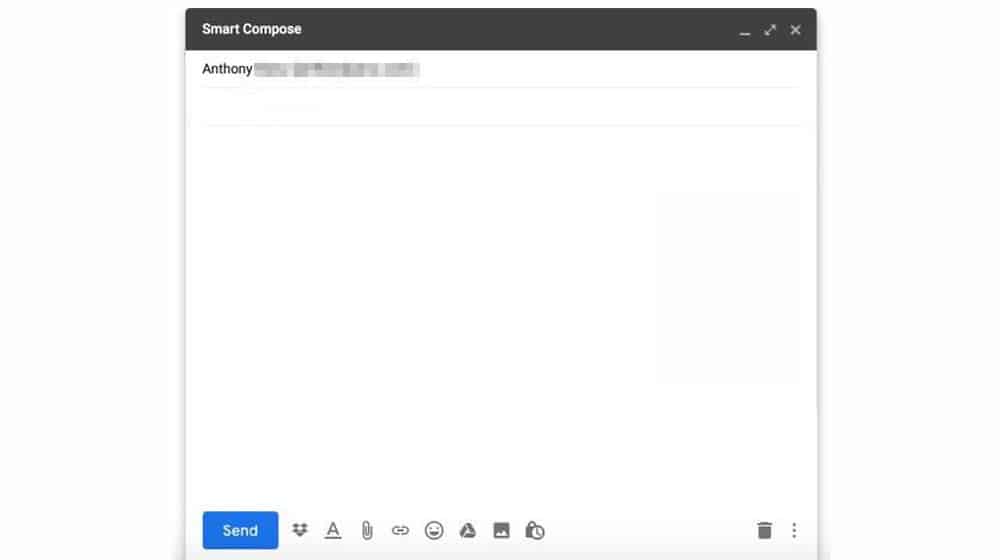
This is the most difficult part because you're taking your relationship from appreciative fan to potential peer or partner. You need to draft a personalized email and avoid the common tropes of spammy outreach.
Don't forget, too, that you should send a follow-up message if you don't get a response. Give it a week or so - sometimes people can take a few days to get back to you.
It's tricky, it can be daunting, but I promise, a lot of bloggers are receptive people. We're all out here facing the same struggles, and relatively few of us are elitist snobs who ignore all but the most noteworthy of contacts. Try it - you might be surprised at who gives you the time of day!










July 09, 2021
Exactly what I was looking for, thank you for taking the time to write this!!
July 15, 2021
Hey Raymond, thanks for the comment! I appreciate it, glad it helped you 🙂
August 02, 2021
This is a good source of info. I love how organized you are. I'm going to try the spreadsheet too!
August 03, 2021
Thanks David!
September 29, 2022
Hunter.io always works for me!
October 07, 2022
Hey Este, thanks for sharing! I love Hunter, I use it every now and again for prospecting.